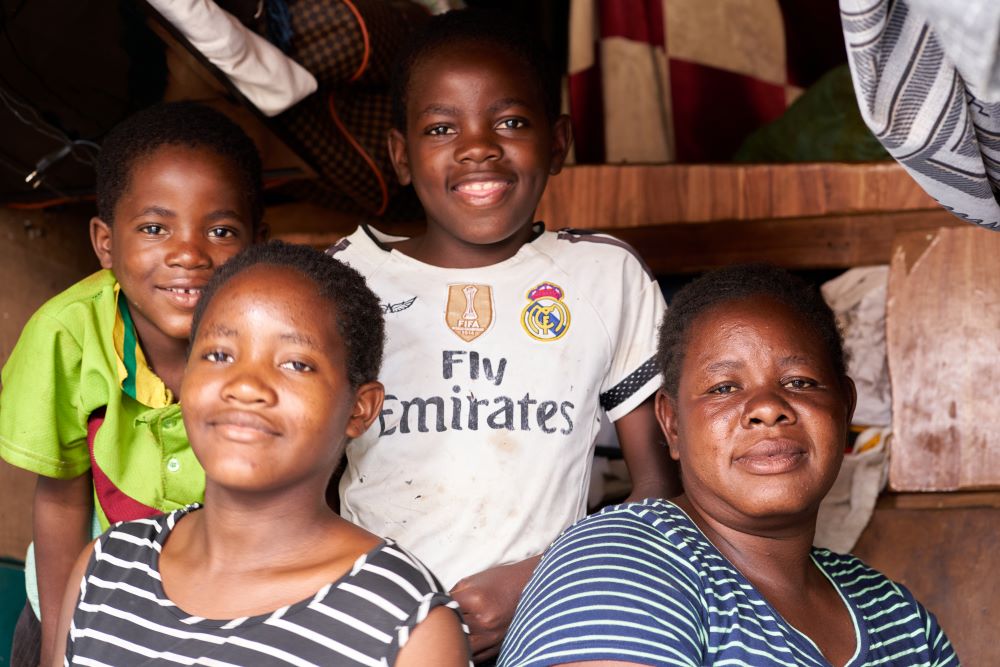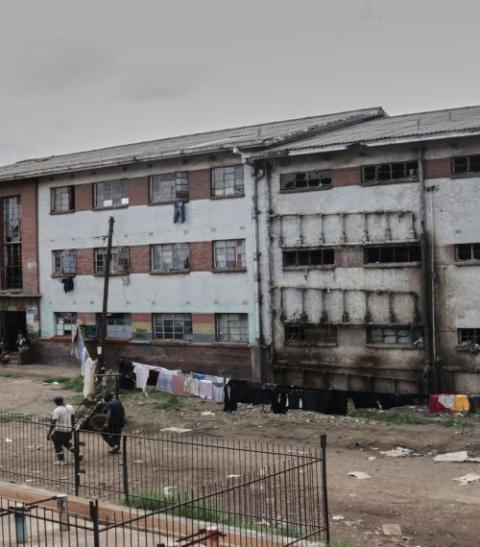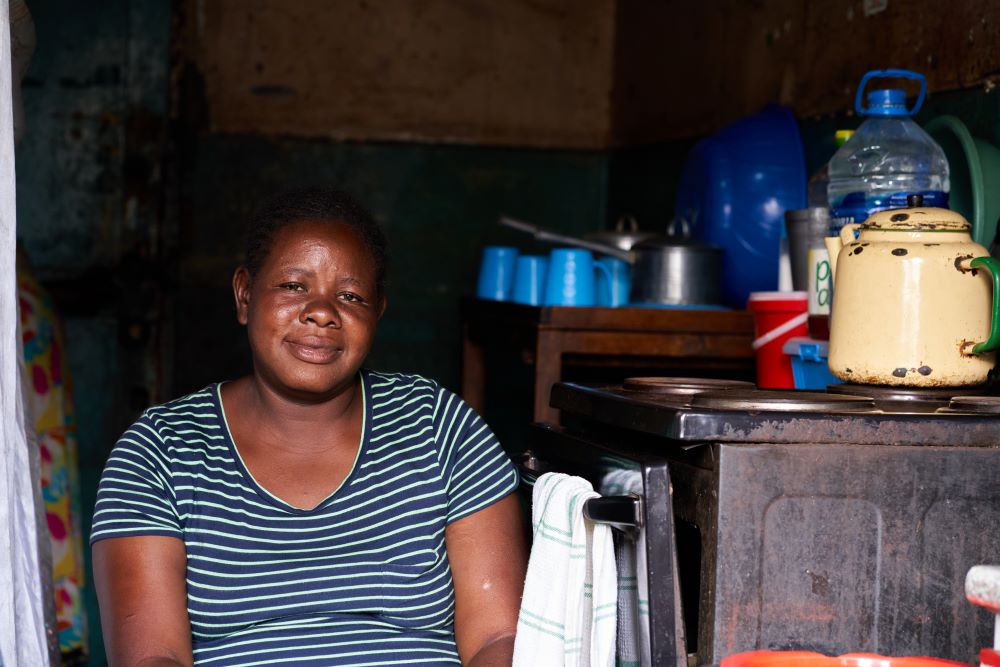
Mary Liawe and her three children pose in their apartment in the Matapi hostel in Harare, Zimbabwe. Live had feared cholera would kill the family in 2023, but all four recovered from the infection. (Courtesy of Thomas Nyarugwe)
As she lay on a ramshackle bed near two of her children at the Beatrice Road Infectious Diseases Hospital in Harare last year, 38-year-old Mary Liawe thought cholera would kill her entire family.
Her family — from Mbare, one of the oldest and most impoverished suburbs of Harare, Zimbabwe's capital — likely contracted the disease inside the dilapidated hostels that frequently have no running water, where communal toilets are rarely cleaned and where raw sewage flows next to makeshift drinking points drilled by development organizations.
It was Liawe's youngest son, Tendai, 7, who first complained of stomach pains and vomiting in June 2023. They took him to a public health facility, where he tested positive for cholera. But there was no medicine to treat him, so they ended up paying $150 for hospitalization and to buy medication from private pharmacies and laboratories.
As soon as Tendai was discharged, Liawe's 12-year-old son, Knowledge, came down with the same symptoms and was rushed to the hospital. Her 14-year-old daughter, Jessica, would be the next to fall ill, forcing all three to be hospitalized at the same time in the same ward.
"I thought my family was being wiped off and it was like the end of the world for me as we lay in the ward next to each other wondering if we were going to recover from the disease," Liawi said in an NCR interview from her rented one-bedroom apartment in Matapi hostel in Mbare.

Block 13 of Matapi Flats is one of many old, dilapidated and poorly maintained hostels where cholera cases have been reported. (Courtesy of Thomas Nyarugwe)
Glancing up to stare at her three children seated on a squeaky bed in front of a rickety wardrobe, Liawe, who lives on income from menial jobs such as washing clothes for people, recalled how Tendai's medical bills left her in a bind.
In Liawi's three-story hostel, one of many such poorly maintained and garbage-ridden structures in Mbare, about five other families have had members hospitalized after contracting cholera during the latest outbreak.
The first case in Zimbabwe's most recent outbreak was reported in February 2023, with cases rapidly spreading across the country's districts, cities and some mining towns. As of Jan. 31, Zimbabwe had recorded 71 confirmed deaths from cholera and 416 suspected deaths. At least 22,000 cases have been confirmed, UNICEF reported.
About 31% of cholera infections in Zimbabwe are among children under 15, according to UNICEF.
Cholera is "an extremely virulent disease transmitted through the ingestion of contaminated food or water," according to the World Health Organization. The disease "is linked to inadequate access to clean water and sanitation facilities." Treatment for severe cases includes IV fluids and antibiotics.
Zimbabwe also faced cholera outbreaks in 2008 and 2018. In 2018 as many as 4,287 Zimbabweans died from cholera, mainly concentrated in Harare, while there were 98,585 reported cases.
From Sept. 4, 2018, through March 12, 2019, 69 people died of cholera and 10,730 cases were reported.
Catholic aid and other development agencies are stepping in to provide much-needed support and assistance to help bring the outbreak under control.
"To support affected communities and prevent further spread of the disease, Catholic Relief Services works closely with local church partners, the Zimbabwe Catholic Bishops' Conference Health Commission in Harare and Caritas Mutare in Buhera district to respond to the cholera outbreak in these two areas," Edson Nyashanu, CRS' water, sanitation and hygiene (WASH) specialist in Zimbabwe, said in an interview.
In Zimbabwe, CRS is focusing on improving communities' access to safe water supplies through rehabilitation of water points in Buhera, one of the most affected districts.

Mary Liawe sits inside her one-room rented apartment in the Matapi hostel in a suburb of Harare, Zimbabwe. She fears cholera will continue to spread until people have access to clean water. (Courtesy of Thomas Nyarugwe)
As the government of Zimbabwe has battled to control the outbreak, President Emmerson Mnangagwa said in a video posted on social media by the Ministry of Information on Feb. 6 that "decisive action is essential to scale up efficiencies within all public institutions, in particular our public health systems, more-so in the context of the cholera" outbreak.
Another Catholic aid agency, CAFOD, has been intervening through a partnership with Caritas Zimbabwe. "Yes, we are responding with Caritas Mutare in Buhera," Charles Makona, CAFOD Zimbabwe's regional program officer for WASH, said by phone.
Catholic health facilities have been stepping in, mobilizing resources to effectively intervene. At St. Albert Mission Hospital in Zimbabwe's Mashonaland Central province, resources are running low as the facility, which can accommodate four admissions for cholera, takes in more patients.
"Right now we are running short of resources including protective clothing, intravenous fluids and disinfectants," reads part of a weekly report compiled by the hospital in late January.
At the Mary Mount Mission Hospital, the first case was reported on Jan. 2 and one case was reported on Jan. 30. During the month, admissions for cholera surged to 10, with one death recorded "due to severe dehydration," a monthly report from the hospital shows.
Even though the government and aid agencies are involved in educational campaigns for residents in hotspot areas to treat water, Gospel Chingwaru, Zimbabwe urban resilience coordinator for aid agency, or GOAL, said in an interview that poverty often prevents households from buying water treatment chemicals.
Gaps in infrastructure such as water supply and sewer reticulation also mean that the current outbreak will be difficult to control.
"A family that is struggling to put food on the table to prioritize sanitation through treating water and cleaning toilets becomes a problem. In most areas such as Hopley and Mbare, there are families that do not have running water," said Chingwaru.
Organizations such as GOAL, CAFOD and CRS have been providing access to clean water points as well as sanitation and hygiene packages. GOAL is also providing cash vouchers and funding to help families.
In Zimbabwe's rural areas, a drought has worsened the situation. This is forcing some villagers to fetch water from contaminated streams and shallow unprotected wells, said Mirirai Muriwo, a village health worker from Makuve village, in an interview.
Advertisement
The current cholera epidemic has affected 13 countries in Eastern and Southern Africa. As of Jan. 15, more than 200,000 cases, including more than 3,000 deaths, have been reported across the region.
Zimbabwe's neighbor, Malawi, has recorded at least 36,943 cases and 1,210 associated deaths from all 29 districts since March 3, 2022. In December, Malawi declared the ongoing cholera outbreak as a public health emergency.
Outbreaks of diseases caused by lack of access to clean water in countries such as Malawi and Zimbabwe are "a result of public health systematic failures, lack of access to clean water by vulnerable communities and poor waste management both in urban and rural areas," Machinda Marongwe. Oxfam program director for Southern Africa, said by email.
Zimbabwe has started a vaccination program against cholera in areas affected the most. The vaccination program aims to deliver doses to 2 million people across affected areas such as suburbs in Harare and Chitungwiza, a dormitory town about 30 kilometers from the capital.
However, without improved access to clean water, the outbreak is likely to continue.
Liawi and her three children recovered from cholera in 2023. But she fears that the current outbreak may worsen as people continue drawing water from sources close to raw sewage flowing from other hostels.
"We have no option but to continue to drink the contaminated water from the water points. The cholera outbreak will not end because we have not addressed the water and sewer issues," she said.








